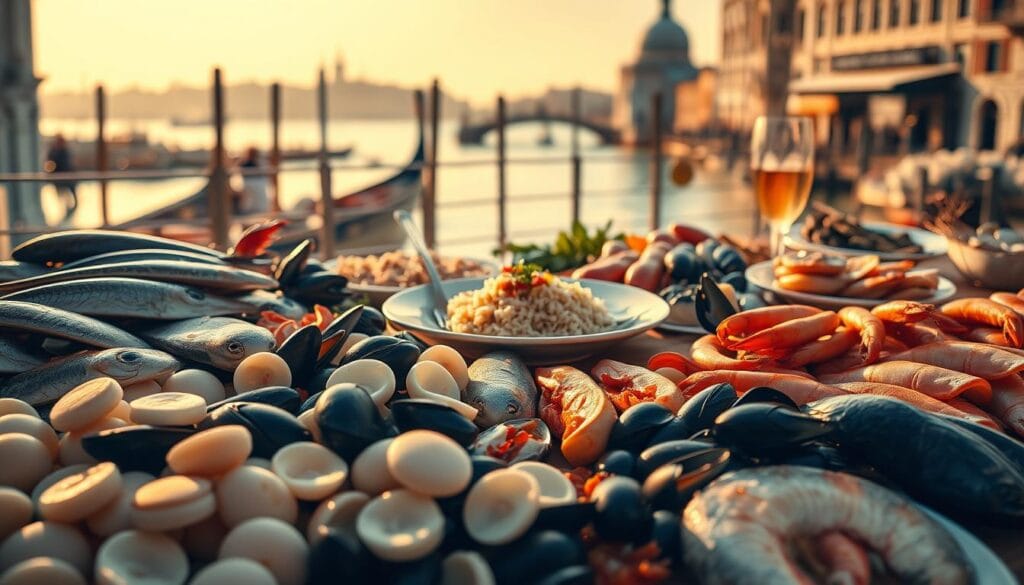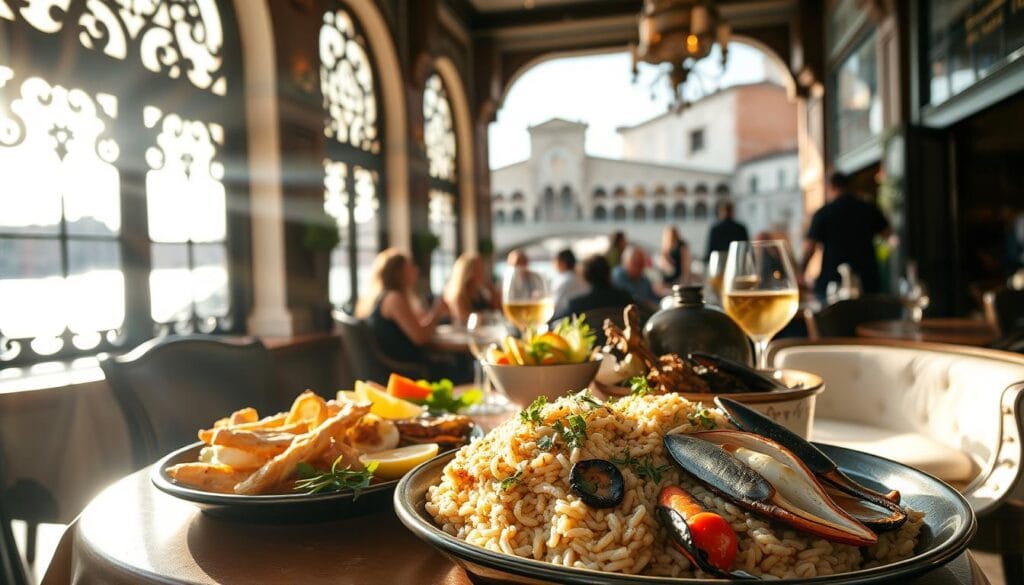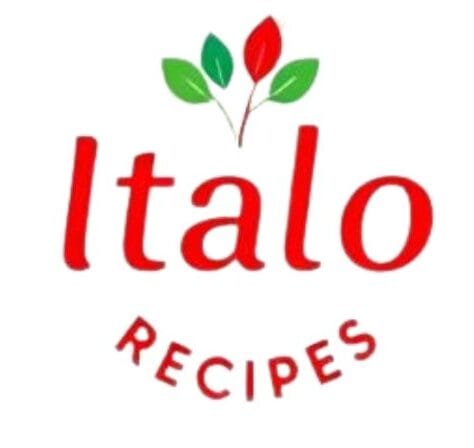What to Eat in Venice?Gastronomy Veneto 2025: The Best Traditional Dishes from the Veneto Region
What to Eat in Venice?Imagine walking through Venice’s historic streets, surrounded by water and rich food traditions. The smell of fresh seafood and local dishes fills the air, inviting you to try Venetian cuisine.
The mix of Mediterranean and Middle Eastern influences makes Venice’s food scene unique. It focuses on fresh seafood and local ingredients, offering a deep food experience.
Exploring Venetian cooking, you’ll find a variety of traditional dishes. From hearty seafood risottos to delicate pastries, Venice’s flavors are waiting for you.
Table of Contents
Key Takeaways
- Experience the authentic flavors of Venetian cuisine, shaped by Mediterranean and Middle Eastern influences.
- Discover traditional Venetian dishes, including seafood risottos and local specialties.
- Explore the rich gastronomic heritage of the Veneto region.
- Savor the freshness of locally sourced ingredients and seafood.
- Immerse yourself in the unique culinary identity of Venice.
The Rich Culinary Heritage of Venice and the Veneto Region
Exploring Venice’s culinary delights reveals a rich heritage. This is shaped by centuries of history and cultural exchange. The Veneto region, at the crossroads of cultures, has deeply influenced local cuisine.
Venetian cuisine’s unique flavor comes from its history. The spice trade brought exotic flavors and ingredients to the region.
Historical Influences on Venetian Cuisine
Venetian cuisine was shaped by its Mediterranean position. This allowed for the exchange of goods, ideas, and cooking practices with other cultures.
The Spice Trade Legacy
The spice trade was key in shaping Venetian cuisine. It introduced spices like cinnamon, cloves, and saffron. These spices add depth and warmth to traditional dishes.
Mediterranean and Eastern Influences
Mediterranean and Eastern influences are seen in Venetian cuisine. The Byzantine Empire and Middle East’s historical ties are reflected in dishes like sarde in saor. This dish shows the cultural exchange between Venice and other Mediterranean cultures.
These influences are evident in Venetian cuisine’s variety of dishes. Here’s a look at some key ingredients and their historical significance:
| Ingredient | Historical Significance | Use in Venetian Cuisine |
|---|---|---|
| Saffron | Introduced through the spice trade, symbolizing wealth and status | Used in risotto and seafood dishes for its flavor and color |
| Cinnamon | Brought from the East, used in both sweet and savory dishes | Adds warmth to meat dishes and desserts |
| Sardines | Preserved in saor (a mixture of onions, raisins, and pine nuts) reflecting Mediterranean influence | Key ingredient in sarde in saor, a traditional Venetian dish |
What to Eat in Venice? Gastronomy Veneto Essentials
Eating in Venice means enjoying the freshest flavors of the season. The Veneto region’s food is all about using local, seasonal ingredients. This makes every meal a true reflection of the area.
Seasonal Eating in Venice
Venice’s food scene focuses on eating with the seasons. This way, dishes are not just tasty but also highlight the best of each season.
Spring and Summer Specialties
In spring and summer, Venetian food is all about fresh seafood, veggies, and fruits. Some top dishes include:
- Seafood Risotto: A creamy risotto with the freshest seafood.
- Grilled Vegetables: Seasonal veggies grilled to perfection.
- Fritto Misto: A mix of seafood and veggies, great as an appetizer.
As the seasons change, so do the dishes. Fall and winter bring heartier options, like:
- Risotto alla Pescatora: A fisherman’s risotto, rich with seafood.
- Braised Meats: Slow-cooked meats that are tender and flavorful.
- Bigoli in Salsa: A traditional Venetian pasta dish with onions and anchovies.
These seasonal dishes show the variety and richness of Venetian cuisine. They offer something special for every season.
Venetian Cicchetti: The Art of Small Bites
As you explore Venice, you’ll find cicchetti, a key part of Venetian food. These small dishes are great with wine or Spritz. They’re more than just appetizers; they’re a taste of Venice’s rich food history.
Cicchetti bars, or « bàcari, » are places where people meet to enjoy these treats. Like tapas in Spain, cicchetti reflect Venetian culture. You’ll find everything from seafood to meat and veggie options, pleasing all tastes.
Popular Cicchetti Varieties
Cicchetti offers a wide range of flavors. Here are some top picks in Venice:
Baccalà Mantecato on Polenta
Baccalà mantecato is a creamy cod spread on polenta. It’s a classic Venetian dish. The cod is made smooth and creamy, showing Venice’s skill in cooking.
Polpette (Meatballs) and Seafood Variations
Polpette, or meatballs, are a hit with locals and visitors. They come with tangy sauce. Seafood options are fresh from the Adriatic, highlighting their natural taste. These dishes show Venice’s love for seafood.
Crostini and Tramezzini Options
You’ll also find crostini and tramezzini, small sandwiches. They’re filled with ham, tuna, and egg salad. These are great for a filling snack.
Trying cicchetti is like a journey through Venice’s tastes and traditions. Whether at a local bàcaro or a festival, these bites are unforgettable. They’re truly some of les meilleurs plats de venise you can try.
Classic Venetian Appetizers (Antipasti)
Venetian cuisine is famous for its appetizers, called ‘antipasti.’ They are a tasty way to start your journey through Venice’s seafood and local tastes. These small dishes let you taste the rich food history of Venice.
Sarde in Saor: Sweet and Sour Sardines
Sarde in Saor is a key Venetian appetizer. It shows Venice’s love for seafood. Fried sardines are marinated in a sweet and sour sauce, making a perfect mix of tastes.
Traditional Preparation Methods
Making Sarde in Saor traditionally means frying fresh sardines until they’re crispy. Then, they’re marinated in onions, raisins, and vinegar. This recipe has been kept alive by families for generations, with each adding their own special touch.
Modern Interpretations
Even though the old recipe is loved, chefs are now trying new things. They add pine nuts or use different vinegars to make the taste even better.
When you visit Venice, don’t miss out on Sarde in Saor. It’s a must-try dish that will impress you, whether you’re in a classic osteria or a modern restaurant.
First Courses: Risotto and Pasta Specialties
The first courses in Venetian cuisine show the region’s rich flavors. They feature risotto and pasta specialties. These dishes are not just tasty but also highlight the Veneto’s culinary skill.
Risotto al Nero di Seppia: Squid Ink Risotto
Risotto al Nero di Seppia, a squid ink risotto, stands out in Venetian cuisine. It’s famous for its unique taste and striking look.
The Perfect Texture and Consistency
Getting the right texture and consistency is key for Risotto al Nero di Seppia. It should be creamy yet tender, with a slight firmness in the middle. This is done by using top-notch ingredients and cooking it just right.
Pairing Suggestions
There are many ways to pair Risotto al Nero di Seppia with other dishes. A dry white wine, like Pinot Grigio, goes well with it. So does a seafood salad or a simple green salad. The goal is to match the risotto’s richness with lighter tastes.
When you visit Venice, make sure to try Risotto al Nero di Seppia. It’s a true taste of Venetian cuisine. With its deep history and cultural importance, it’s a dish you won’t forget.
Seafood Main Courses from the Venetian Lagoon

The seafood of the Venetian Lagoon is a big deal in many main courses. Each dish shows the region’s love for fresh, local ingredients. Seafood is a big part of many traditional Venetian dishes, showing the lagoon’s wealth and the region’s food history.
Fegato alla Veneziana: Venetian-Style Liver
Fegato alla Veneziana, or Venetian-style liver, is a classic dish. It’s made with calf liver, onions, and white wine. It’s a flavorful dish that shows the region’s cooking traditions.
The Perfect Onion-to-Liver Ratio
Getting the onion-to-liver ratio right is key for Fegato alla Veneziana. Too many onions can overpower the dish, while too few might make it lack depth. The onions are cooked slowly until sweet and caramelized, enhancing the liver’s rich flavor.
Historical Significance
Fegato alla Veneziana has a long history in Venetian cuisine. It dates back to when liver was common among the city’s poor. Over time, it became a beloved dish, known for its hearty flavors and history.
To understand traditional Venetian dishes better, here’s a look at some popular seafood main courses and their variations:
| Dish | Main Ingredients | Preparation Method |
|---|---|---|
| Fritto Misto | Mixed seafood (shrimp, calamari, whitebait) | Deep-fried |
| Brudet | Assorted fish, tomatoes, onions, white wine | Stewed |
| Grilled Fish | Fresh catch of the day (varies) | Grilled with herbs and lemon |
Exploring seafood main courses from the Venetian Lagoon is a culinary journey. From fresh, grilled fish to traditional dishes like Fritto Misto and Brudet, each meal shows Venice’s deep connection to the sea and its bounty.
Meat Dishes and Inland Specialties of Veneto
While Venice is famous for its seafood, the Veneto region’s inland areas have their own culinary treasures. The area’s varied landscapes, from mountains to plains, have led to many hearty meat dishes.
Polenta e Schie: Polenta with Lagoon Shrimp
Polenta e Schie is a standout dish from Veneto. It combines creamy polenta with lagoon shrimp. This dish shows off the region’s rich culinary history, offering a true taste of cuisine vénitienne authentique.
The Perfect Polenta Consistency
Getting the polenta just right is key. It should be creamy but still hold its shape. The secret is slow cooking, which lets the polenta soak up all the flavors.
Seasonal Availability of Schie
The lagoon shrimp, or Schie, are only available at certain times. This makes Polenta e Schie a special dish, enjoyed during specific seasons.
Other notable meat dishes and inland specialties include:
- Bigoli in Salsa: A pasta dish with bigoli (thick, wholemeal spaghetti) and a rich meat and onion sauce. It’s a true spécialité culinaire vénitienne.
- Fegato alla Veneziana: Venetian-style liver and onions. It’s a classic dish that shows the simplicity and flavor of Venetian cuisine, among the les meilleurs plats de Venise.
These recettes traditionnelles vénitiennes showcase the region’s rich culinary heritage.
Sweet Endings: Venetian Desserts and Pastries
The Veneto region is famous for its delicious desserts. These treats are a big part of the Venetian food scene. You’ll find many sweet options that will make your taste buds happy.
Tiramisu: Veneto’s Famous Coffee Dessert
Tiramisu is a well-known Venetian dessert loved all over the world. It’s a must-try in any Venetian bakery or restaurant.
The Authentic Recipe
The real Tiramisu recipe uses ladyfingers soaked in espresso and liqueur. It’s layered with a creamy mascarpone cheese mix. This makes a dessert that’s both rich and light.
Best Places to Try It
To try authentic Tiramisu, go to Al Covo or Torre di Mosto in Venice. These places are famous for their traditional Tiramisu made with the best ingredients.
In Venice, trying Tiramisu is a must. This beloved dessert shows the region’s love for food and quality ingredients.
Venetian Wines and Beverages to Complement Your Meal
Pairing your meal with the right wine can make your dining experience even better. The Veneto region is famous for its amazing wines. These wines match perfectly with the local dishes.
Prosecco: The Signature Sparkling Wine
Prosecco is a well-known wine from the Veneto region. It has a crisp, refreshing taste. This makes it a great match for many Venetian dishes.
DOCG Varieties
Prosecco DOCG is of the highest quality. Prosecco Superiore is made with the best grapes and traditional methods. This results in a more refined taste.
Food Pairing Suggestions
Prosecco goes well with many Venetian appetizers, like cicchetti and seafood. For a classic choice, try it with Sarde in Saor. This is a traditional Venetian appetizer that’s sweet and sour.
| Wine | Pairing Suggestions |
|---|---|
| Prosecco DOCG | Cicchetti, seafood, Sarde in Saor |
| Soave | Seafood risotto, grilled fish |
| Amarone | Meat dishes, polenta |
Choosing the right wine can make your Venetian meal even better. Whether you’re enjoying Risotto al Nero di Seppia or Tiramisu, the right wine will enhance the flavors.
Where to Experience Authentic Venetian Cuisine in 2025
To find the real taste of Venice, look beyond the usual tourist spots. The city’s true flavors are found in its traditional osterias. Here, locals have enjoyed classic dishes for centuries.
Traditional Osterias Away from Tourist Areas
Exploring Cannaregio and Dorsoduro will take you to authentic Venetian cuisine. These areas are full of traditional osterias. They serve some of the best traditional Venetian dishes.
Cannaregio Hidden Gems
Cannaregio is a goldmine of authentic eateries. Some places you must visit include:
- Osteria ai Assassini, known for its creative takes on traditional Venetian cuisine.
- Al Covo, a cozy spot serving classic dishes in a warm atmosphere.
Dorsoduro Local Favorites
Dorsoduro is another neighborhood with many authentic dining spots. Make sure to visit:
- Cantina Do Mori, a historic wine bar serving cicchetti.
- Osteria La Zucca, offering a unique dining experience with a focus on local ingredients.
When dining at these osterias, try local specialties like sarde in saor or fegato alla veneziana. These dishes show the heart of Venetian gastronomy. They highlight the region’s rich culinary history.
Exploring these neighborhoods and dining at local osterias will give you a true taste of Venice. It’s far from the tourist crowds. Enjoy your culinary journey through the authentic flavors of Venetian cuisine in 2025.
Conclusion: Embracing the Flavors of Venice and Veneto
Exploring Venice and Veneto’s flavors is a journey filled with rich history and delicious food. You’ll find a world of authentic Venetian cuisine that will excite your senses.
The Veneto region is famous for its specialités culinaires vénitiennes. From cicchetti to seafood dishes, each tells a story of the region’s history and culture. By trying the best traditional dishes and wines, you’ll learn to love the region’s culinary identity.
To really taste Venice and Veneto, visit traditional osterias and restaurants. There, you can enjoy les meilleurs plats de Venise in a real setting. Here’s a table with some dishes and drinks you must try:
| Dish/Drink | Description |
|---|---|
| Risotto al Nero di Seppia | Squid ink risotto, a classic Venetian dish |
| Sarde in Saor | Sweet and sour sardines, a traditional Venetian appetizer |
| Prosecco | The signature sparkling wine of Veneto |
By embracing Venice and Veneto’s flavors, you’ll have a culinary adventure. You’ll also learn more about the region’s culture and traditions. Whether you love food or just want to try new things, Veneto is a place that will impress your taste buds.
What to Eat in Venice? Gastronomy Veneto2025: The Best Traditional Dishes from the Veneto Region

As you explore Venice, you’ll be drawn to its unique food scene. The city’s rich gastronomic heritage combines Mediterranean and Middle Eastern tastes. This mix comes from Venice’s history and culture.
The city’s love for fresh seafood is a big part of its food traditions. You’ll find many authentic dishes that highlight the region’s specialties. These range from classic Venetian recipes to new culinary ideas.
Trying local food is key to experiencing Venice. With its unique blend of flavors, Venetian cuisine is a delight for food enthusiasts. Let’s explore the top traditional dishes to try when you visit.
Key Takeaways
- Savor the authentic flavors of Venetian cuisine, influenced by Mediterranean and Middle Eastern heritage.
- Indulge in fresh seafood, a staple in Venetian cooking.
- Explore traditional Venetian dishes and recipes that showcase the region’s culinary identity.
- Experience the unique blend of flavors that Venetian cuisine has to offer.
- Discover the best traditional dishes to try during your visit to Venice.
The Rich Culinary Heritage of Venice and the Veneto Region
The culinary heritage of Venice and the Veneto region is rich and varied. It has roots in ancient traditions and has been influenced by many cultures. Venice’s history as a trading hub has made its cuisine unique, introducing many ingredients and cooking methods.
The Venetian cuisine is known for its fresh seafood. This is because Venice started as a fishing community. You’ll find dishes with shrimp, mussels, and clams, along with local vegetables and herbs. The Veneto region adds to this with its own dishes, like risottos and polentas.
Historical influences are a big part of Venetian cuisine. For example, the use of saffron and spices comes from the city’s trading days. Dishes like Sarde in Saor (sweet and sour sardines) show how flavors and techniques have evolved over time.
| Dish | Main Ingredients | Region |
|---|---|---|
| Risotto al Nero di Seppia | Squid ink, seafood | Venice |
| Polenta e Schie | Polenta, lagoon shrimp | Veneto |
| Fegato alla Veneziana | Liver, onions | Venice |
Exploring Venice and the Veneto region’s cuisine is like a journey through history and culture. When you try the local dishes, you’re part of a tradition shaped by centuries of innovation and cultural exchange.
Conclusion: Embracing the Flavors of Venice and Veneto
Exploring Venice and the Veneto region opens a world of unique flavors. The cuisine vénitienne authentique features fresh seafood and local ingredients. Traditional cooking methods add to the charm. Each dish, like risotto al nero di seppia, shares the region’s rich history and culture.
Trying local recettes traditionnelles vénitiennes is key to experiencing Venice and Veneto’s flavors. Cicchetti at an osteria or seafood risotto at a trattoria are unforgettable. So, explore the region’s culinary specialties and see why it’s a food lover’s dream.

